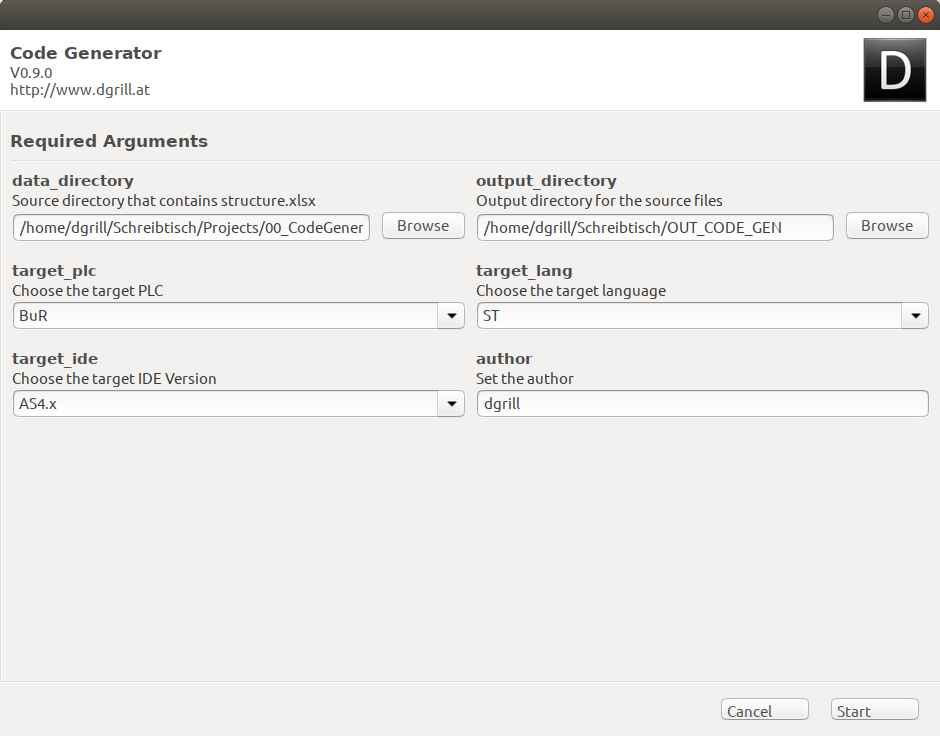Bash Skripte 2018
Im Zuge der Vorbereitung auf die LPIC 1 Prüfung, enstand diese Github Repo. Es umfasst die Grundlagen rund um das Thema Bash Skripting, und soll in weiterer Zukunft als Sammlung von nützlichen Skripten für den täglichen gebrauch dienen.
Link zum Github Repo:
https://github.com/dg60/Bash_Scripts
Basics
Um ein skript ausführen zu können muss diese erst ausführbar gemacht werden:
$ chmod 755 script.sh
Deklarieren von Variablen
#!/bin/bash
#
# declare variables
#
var1=4
var33=300
var42=400
echo var1 = $var1
echo $var33 $var42
Ausgabe:
$ ./var.sh
var1 = 4
300 400
IF Abfrage
#!/bin/bash
# Basic if statement
if [ $1 -gt 100 ]
then
echo Hey that\'s a large number.
else
echo Hey that\'s a small number.
fi
#Read out the actual time
date
Ausgabe:
$ ./if.sh 1
"Hey that's a small number.
Sun Feb 25 11:25:19 CET 2018"
$ ./if.sh 101
"Hey that's a large number.
Sun Feb 25 11:25:34 CET 2018"
IF ELIF Abfrage
#!/bin/bash
# elif statements
if [ $1 -ge 18 ]
then
echo You may go to the party.
elif [ $2 == 'yes' ]
then
echo You may go to the party but be back before midnight.
else
echo You may not go to the party.
fi
Ausgabe:
$ ./if_elif.sh 20
You may go to the party.
$ ./if_elif.sh 15 yes
You may go to the party but be back before midnight.
Case Abfrage
#!/bin/bash
# case example
case $1 in
start)
echo starting
;;
stop)
echo stoping
;;
restart)
echo restarting
;;
*)
echo don\'t know
;;
esac
Ausgabe:
$ ./case.sh
"don't know"
$ ./case.sh start
starting
$ ./case.sh stop
stoping
While loop
#!/bin/bash
# Basic while loop
counter=1
while [ $counter -le 10 ]
do
echo $counter
((counter++))
done
echo All done
Ausgabe:
$ ./while_loop.sh
1
2
3
4
5
6
7
8
9
10
All done
Until loop
#!/bin/bash
# Basic until loop
counter=1
until [ $counter -gt 10 ]
do
echo $counter
((counter++))
done
echo All done
Ausgabe:
$ ./until_loop.sh
1
2
3
4
5
6
7
8
9
10
All done
For loop
#!/bin/bash
# Basic for loop
names='Kylo Rey Luke'
for name in $names
do
echo $name
done
echo All done
Ausgabe:
$ ./for_loop.sh
Kylo
Rey
Luke
All done
Functions
#!/bin/bash
# Passing arguments to a function
print_something () {
echo I love $1
return 1
}
print_something RedBull
print_something coffe
Ausgabe:
$ ./function_arguments.sh
I love RedBull
I love coffe
Verwendung von lokalen Variablen
#!/bin/bash
# local variables
var_change () {
local var1='local 1'
echo Inside function: var1 is $var1 : var2 is $var2
var1='changed again'
var2='2 changed again'
}
var1='global 1'
var2='global 2'
echo Before function call: var1 is $var1 : var2 is $var2
var_change
echo After function call: var1 is $var1 : var2 is $var2
Ausgabe:
$ ./local_variables.sh
Before function call: var1 is global 1 : var2 is global 2
Inside function: var1 is local 1 : var2 is global 2
After function call: var1 is global 1 : var2 is 2 changed again
Rechenoperationen (Arithmetic)
#!/bin/bash
# Basic arithmetic using let
let a=5+4
echo $a # 9
let "a = 5 + 4"
echo $a # 9
let a++
echo $a # 10
let "a = 4 * 5"
echo $a # 20
let "a = $1 + 30"
echo $a # 30 + first command line argument
Ausgabe:
$ ./let.sh
9
9
10
20
30
Beispiele
Einbinden eines config Files
#config.sh
#!/usr/bin/env bash
#read out enviroment variables
user=${USER}
home=${HOME}
id=${UID}
#sourcing.sh
#!/usr/bin/env bash
. ./config.sh
echo "The name of the actual user was: $user with the id: $id "
echo "The Home directory of the user: $home"
echo "The log in history of the actual user:"
users=$(who | cut -d' ' -f1 | sort)
last | grep $users
Ausgabe:
$ ./sourcing.sh
The name of the actual user was: user with the id: 9999
The Home directory of the user: /home/user
The log in history of the actual user:
user tty7 :0 Sun Feb 25 08:40 gone - no logout
user tty7 :0 Wed Feb 14 19:00 - down (7+13:05)
user tty7 :0 Fri Feb 9 22:04 - down (4+00:03)
user tty7 :0 Wed Feb 7 19:06 - down (2+00:57)
user tty7 :0 Sat Feb 3 10:20 - down (01:04)
user tty7 :0 Fri Feb 2 20:47 - down (02:18)
user tty7 :0 Thu Feb 1 21:33 - crash (23:12)
user tty7 :0 Thu Feb 1 20:32 - down (01:00)
Anlegen eines users
#!/usr/bin/env bash
# Add a user on a debian based System
# need root privilege
#check if the user has root privilege
if (( $EUID != 0 )); then
echo "Please run the script as root or with sudo !"
exit
fi
clear;
echo -e "Please enter the name of the user:"
read username
clear;
echo -e "Please enter the path of the home directory /home/username:"
read homedir
clear;
echo -e "Please enter a description for the user"
read description
# add the user
useradd -m -d ${homedir} -c ${description} ${username}
#check if the user was added
echo -e "User was added"
tail -1 /etc/passwd
#set the password for the user
echo -e "Please enter the password for ${username}"
passwd ${username}
Ausgabe:
$ sudo ./useradd.sh
Please enter the name of the user:
hugo
Please enter the path of the home directory /home/username:
/home/hugo
Please enter a description for the user:
test
User was added
hugo:x:1003:1003:test:/home/hugo:
Please enter the password for hugo
Geben Sie ein neues UNIX-Passwort ein:
Geben Sie das neue UNIX-Passwort erneut ein:
passwd: Passwort erfolgreich geändert




